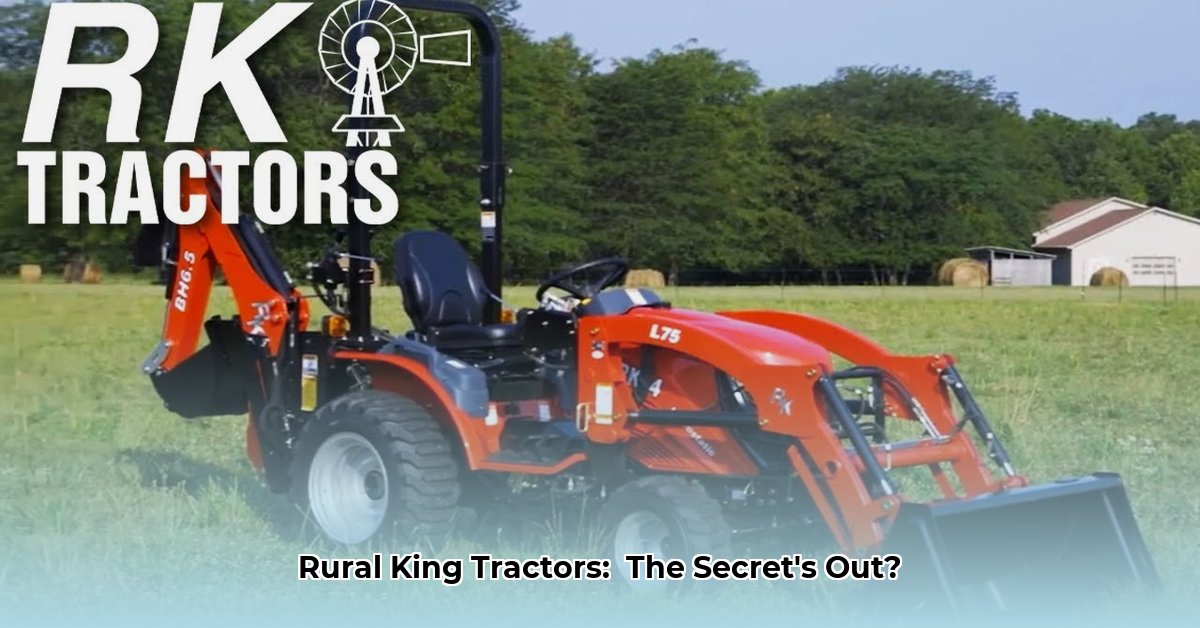
Thinking about a Rural King tractor for your sustainable farm? This comprehensive guide examines user experiences, warranty details, and potential challenges to help you decide if it's the right investment. The lower upfront cost is alluring, but are the long-term implications worth the savings? Let's explore. For more on tractor costs, see this helpful resource: tractor cost analysis.
The Allure of Affordability: A Budget-Friendly Choice?
Rural King tractors are significantly cheaper than established brands like John Deere, making them attractive to smaller farms or those starting out. This lower initial investment allows for greater allocation of funds towards other crucial aspects of sustainable agriculture, such as soil improvement or crop diversification. But is this initial saving ultimately worthwhile?
The Eight-Year Warranty: A Solid Promise or a Conditional Guarantee?
Rural King offers an eight-year or 3,000-hour powertrain warranty, covering the engine and transmission. This sounds impressive, but its true value hinges on timely parts availability and efficient service. Many users report significant delays in obtaining parts, impacting farm productivity. “The delays in getting parts are unacceptable," says Sarah Miller, owner of Miller Family Farms in Iowa. "We lost two weeks of harvest due to a simple transmission issue.”
Parts Availability: A Major Bottleneck
Numerous reviews highlight the difficulty in securing replacement parts. Delays often extend for weeks, even months. This downtime can be financially devastating – a stalled harvest season represents significant financial losses and undermines the efficiency crucial for sustainable farming practices. Is the initial cost saving offset by the potential yield losses due to unplanned downtime?
Service Experiences: A Tale of Two Extremes
Reported service experiences are inconsistent. Some users praise quick repairs and helpful staff, while others describe slow responses, poor communication, and frustrating repair processes. This unpredictable service further impacts the overall value of the warranty and could result in higher repair costs. "The service was abysmal," stated David Chen, owner of Chen's Organic Produce. "It took three months to get my tractor back – way beyond what the warranty is supposed to cover."
Build Quality: A Mixed Bag of Observations
While many report positive experiences, others describe premature failures, such as transmission pump issues, corroded wiring, and even complete transmission system failures. These problems lead to substantial repair bills and significant downtime, potentially jeopardizing the long-term sustainability of your operation.
Rural King Tractors: A Balanced Assessment
Below is a summary of the pros and cons, derived from numerous reviews and user feedback:
| Feature | Pros | Cons |
|---|---|---|
| Price | Significantly lower than competitors. | May reflect compromises in materials or design. |
| Warranty | Eight-year/3,000-hour powertrain warranty. | Effectiveness limited by parts availability and service response times. |
| Ease of Use | Generally user-friendly. | Fewer advanced features than higher-end models. |
| Parts Availability | Major concern; frequent and substantial delays reported. | Significant impact on farm efficiency and profitability. |
| Service Response Times | Inconsistent; rapid service reported by some, significant delays by others. | Unpredictable service undermines warranty value and increases repair costs. |
| Quality Control | Mixed reports; positive experiences alongside early failures. | Potential for costly repairs and extended downtime. |
Making the Right Choice for Your Sustainable Farm
Before purchasing, consider these steps for a successful outcome:
- Thorough Research: Examine online reviews, focusing on specific models and identifying recurring issues.
- Realistic Budgeting: Include potential repair costs and income loss due to downtime in your financial projections.
- Explore Alternate Parts Sources: Explore alternative suppliers for parts, if possible.
- Long-Term Cost Analysis: Calculate the tractor's total cost of ownership (TCO), encompassing purchase price, repairs, and maintenance.
- Risk Assessment: Evaluate your tolerance for potential downtime and unexpected expenses.
Mitigating Rural King Tractor Repair Delays
The core challenge is the interplay of parts scarcity and inconsistent dealer support. To mitigate these risks:
- Investigate Local Dealers: Assess their parts inventory, technician experience, and customer service reputation before making a purchase.
- Warranty Expansion: Consider an extended warranty to reduce the financial impact of unexpected repairs.
- Needs Assessment: Assess whether a Rural King tractor aligns with your specific farming operations and demands. For heavy-duty work, a higher-end brand might be a wiser investment.
- Preventative Maintenance: Regular maintenance reduces breakdowns and extends equipment lifespan.
- Dealer Relationship: Cultivate a positive working relationship with your dealer for better service.
- Contingency Planning: Develop backup plans to manage potential downtime and maintain farm productivity.
Rural King tractors offer a tantalizingly low price point, yet their long-term reliability and service support pose considerable risks to sustainable agricultural operations. Before you buy, carefully assess these risks and consider whether the considerable cost savings outweighs the potential for extensive repairs, parts shortages, and substantial downtime.